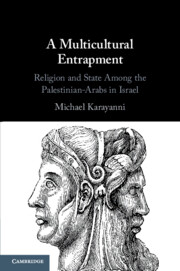Book contents
- A Multicultural Entrapment
- A Multicultural Entrapment
- Copyright page
- Dedication
- Contents
- Preface
- 1 Religion-and-State Conflict in Israel
- 2 The Janus-Faced Religion-and-State Conflict in Israel
- 3 Palestinian-Arab Religious Jurisdiction As an Individual Predicament
- 4 The Acute Nature of the Palestinian-Arab Individual Predicament
- 5 The Individual Predicament As Multicultural Entrapment
- 6 The Voice of No Exit
- Epilogue
- Bibliography
- Index
4 - The Acute Nature of the Palestinian-Arab Individual Predicament
Published online by Cambridge University Press: 08 January 2021
- A Multicultural Entrapment
- A Multicultural Entrapment
- Copyright page
- Dedication
- Contents
- Preface
- 1 Religion-and-State Conflict in Israel
- 2 The Janus-Faced Religion-and-State Conflict in Israel
- 3 Palestinian-Arab Religious Jurisdiction As an Individual Predicament
- 4 The Acute Nature of the Palestinian-Arab Individual Predicament
- 5 The Individual Predicament As Multicultural Entrapment
- 6 The Voice of No Exit
- Epilogue
- Bibliography
- Index
Summary
The individual predicament of the Palestinian-Arabs resulting from the recognition accorded to their respective religious communities is often presented at par with that of Jewish citizens in Israel who also happen to be subject to rabbinical jurisdiction as well as that of members of Western religious minorities. This chapter argues that the Palestinian-Arab predicament is genuinely different from all these other predicaments including that of the Jewish citizens of Israel. It is different because it is much more acute in nature. That is so for two main reasons. First, ideas and mechanisms that have been suggested for relieving the predicament in Western democracies do not apply in the Israeli case because of Israel’s character as a Jewish state. This exclusion works actively as well to strengthen the religious identity of Palestinian-Arabs and thus tighten yet further the grip of Palestinian-Arab religious communities over their members. Second, in light of the long-lasting Palestinian (Arab)–Israeli conflict and the rift this conflict has created in minority-majority relations in Israel, secular forces among the Palestinian-Arabs, let alone religious ones, are reluctant to initiate reforms in the existing jurisdictional authority, which despite its obvious oppression still shows outwardly the remaining shreds of autonomy.
- Type
- Chapter
- Information
- A Multicultural EntrapmentReligion and State Among the Palestinian-Arabs in Israel, pp. 146 - 191Publisher: Cambridge University PressPrint publication year: 2020

